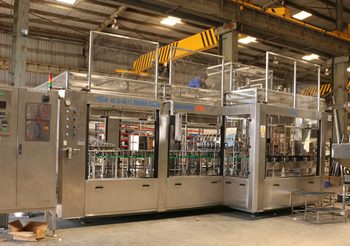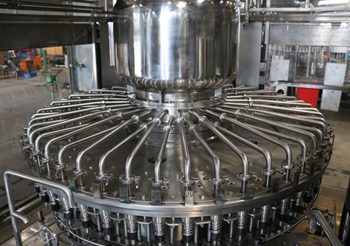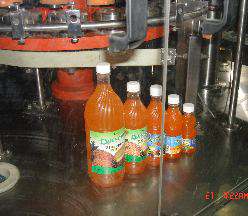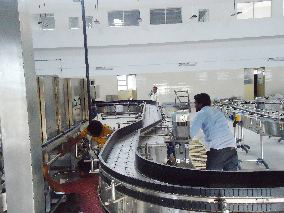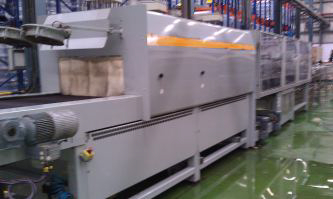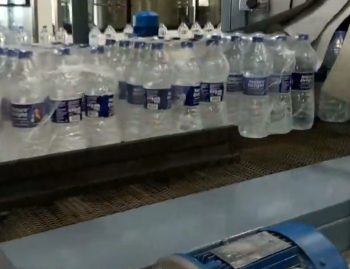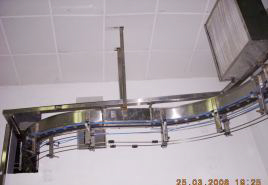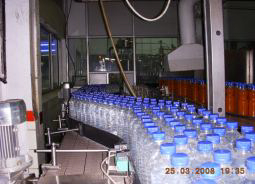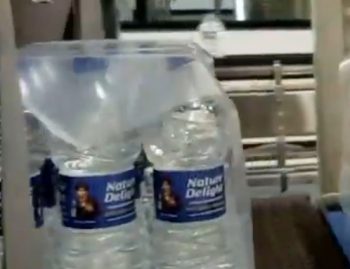
Introduction to Can Filling Machines
In the fast-paced world of beverage production, efficiency and speed are paramount. With consumers demanding quick access to their favorite drinks, manufacturers must keep up with ever-increasing expectations. Enter can filling machines: the unsung heroes of the beverage packaging process. These ingenious devices streamline operations, ensuring that beverages are filled, sealed, and ready for distribution in record time.
Imagine a bustling plant where bottles clink together as workers rush to meet deadlines. Now picture a smooth-running system where cans glide effortlessly through automated lines—no spills or delays in sight. Can filling machines represent this modern marvel of productivity and precision.
But how do these machines work? What types exist? And why should businesses consider investing in them? Join us as we delve into the intricacies of can filling machines and discover why they truly are the key to fast and efficient beverage packaging.
How Can Filling Machines Work
Can filling machines operate through a blend of precision and automation. The process begins with cans moving along a conveyor belt, where they are automatically positioned for filling.
Once in place, the machine activates valves that open to dispense liquid into each can. This is often controlled by sensors that ensure the right amount fills every container without spillage or waste.
After filling, a sealing mechanism comes into play. It caps each can securely to maintain freshness and prevent leaks during transportation.
Advanced models feature high-speed operations capable of handling thousands of cans per hour. Integrated technology allows for adjustments based on different beverage types and volumes too.
Maintenance plays a critical role in their function as well. Regular checks keep them running smoothly, ensuring efficiency remains at peak levels throughout production cycles.
Benefits of Using Can Filling Machines for Beverage Packaging
Can filling machines revolutionize beverage packaging with their speed and precision. They significantly reduce the time it takes to fill cans, allowing businesses to meet high demand effortlessly.
Consistency is another major advantage. These machines ensure that every can is filled accurately, minimizing waste and maintaining product quality. This reliability boosts customer satisfaction as consumers receive a uniform experience.
Cost efficiency also plays a significant role in adopting can filling technology. By automating the process, companies cut down on labor costs while enhancing productivity.
Moreover, modern can filling machines are versatile. They can handle different sizes and types of beverages seamlessly, adapting quickly to changing market trends or consumer preferences.
Sustainability cannot be overlooked either. Many advanced models use less energy and generate less waste compared to traditional methods, aligning with eco-friendly initiatives crucial for today’s brands.
Types of Can Filling Machines
Can filling machines come in various types, each designed to meet specific production needs. The most common are gravity fillers, which rely on the force of gravity to fill cans quickly and efficiently. These machines work well for low-viscosity liquids like water or soft drinks.
Another popular option is pressure fillers. Unlike gravity fillers, these use pressurized gas to push the liquid into cans. This method is ideal for carbonated beverages as it helps maintain fizziness during the filling process.
Then there are volumetric fillers that measure exact quantities before dispensing the liquid into each can. This precision makes them suitable for thicker products such as sauces or syrups.
Aseptic filling machines cater specifically to products requiring a sterile environment. They ensure that beverages remain uncontaminated throughout packaging, crucial for shelf-stable juices and dairy alternatives. Each type plays a vital role in enhancing efficiency and maintaining product quality in beverage packaging operations.
Factors to Consider When Choosing a Can Filling Machine
Selecting the right can filling machine involves several critical factors. First, consider your production volume. Machines vary in speed and capacity, so aligning your equipment with demand is crucial.
Next, evaluate the type of beverage you’re packaging. Carbonated drinks require different machines than non-carbonated ones due to pressure considerations and fill techniques.
Flexibility is another important aspect. A versatile machine that accommodates various can sizes can save costs and space in the long run.
Don’t overlook maintenance requirements either. Some models may need more frequent servicing or specialized parts, impacting overall efficiency.
Factor in budget constraints. Weigh initial purchase prices against potential operating costs over time to make an informed decision tailored to your business needs.
Case Studies: Success Stories from Companies Using Can Filling Machines
A craft brewery in Oregon recently transformed its production line with a state-of-the-art can filling machine. This upgrade allowed the team to triple their output while maintaining quality standards. Customers noticed the faster turnaround times, and sales skyrocketed.
Another success story comes from a beverage startup focused on health drinks. Initially bottling their products by hand, they faced challenges meeting growing demand. After investing in an automated can filling machine, they streamlined operations and reduced labor costs significantly. The result? They not only kept pace with market trends but also expanded into new regions.
In Texas, a soft drink manufacturer adopted advanced can filling technology that improved precision during the filling process. This innovation minimized waste and ensured every can was filled perfectly, boosting consumer satisfaction and brand loyalty remarkably. Each case showcases how embracing modern equipment leads to tangible results in efficiency and profitability for businesses across the beverage landscape.
Future of Can Filling Machines in the Beverage Industry
The future of can filling machines is bright, driven by technological advancements and evolving consumer demands. Automation will play a pivotal role, enhancing speed while ensuring precision in filling processes.
Sustainability is becoming crucial. Manufacturers are exploring eco-friendly materials and energy-efficient systems to minimize waste. This shift aligns with the growing preference for environmentally responsible products among consumers.
Integration with smart technologies like IoT ensures real-time monitoring and predictive maintenance. Such innovations enable manufacturers to optimize production efficiency continually.
Customization will also be key. As beverage brands diversify their offerings, flexible can filling machines that adapt to different sizes and product types will gain popularity.
The focus on quality control remains paramount as companies strive for excellence in every aspect of production. The marriage of innovation and sustainability positions can filling machines at the forefront of the beverage industry’s evolution.
Conclusion
Can filling machines have transformed the beverage packaging landscape. As consumer demand for efficient and high-quality products rises, these machines offer a solution that meets industry needs. The speed, accuracy, and versatility of can filling machines make them indispensable in today’s market.
With various types available, businesses can choose models tailored to their specific requirements. This adaptability enhances operational efficiency while reducing labor costs and minimizing waste.
The success stories from companies adopting these technologies illustrate not just improved productivity but also greater customer satisfaction. As innovations continue to emerge, embracing advanced solutions like can filling machines will undoubtedly play a pivotal role in the future of the beverage industry.
Investing in quality machinery is essential for any brand looking to stay competitive. With continuous advancements on the horizon, now is an opportune moment for businesses to consider how can filling machines could elevate their packaging processes.
